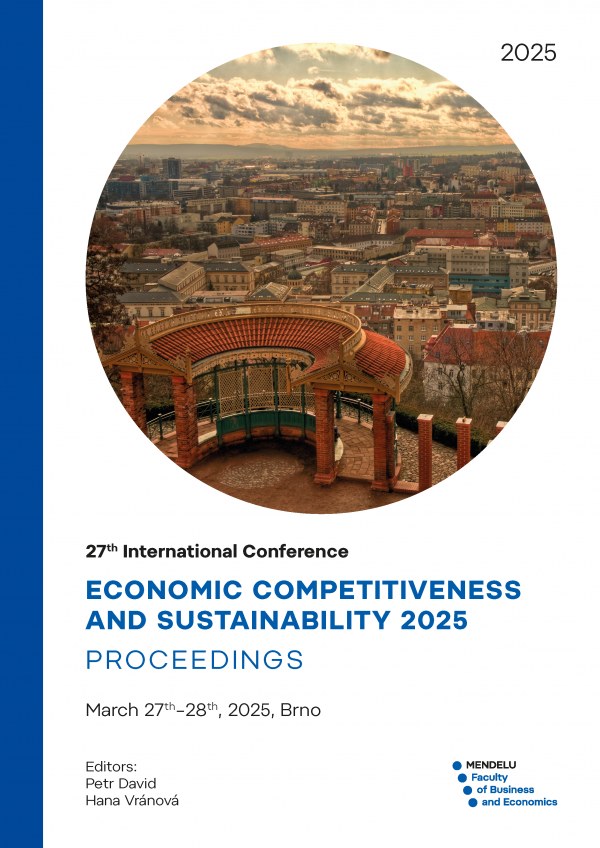
DOI: 10.11118/978-80-7701-047-4-0145
THE SUSTAINABILITY TRAJECTORY IN BUSINESS: EXPERIENCES FROM THE SLOVAK REPUBLIC
- Denis Pinka1, Mariana Sedliačiková1, Martin Halasz1
- 1 Department of Economics, Management and Business, Faculty of Wood Sciences and Technology, Technical University in Zvolen, T. G. Masaryka 24, 960 01 Zvolen, Slovak Republic
Sustainable business is one of the main strategic factors for businesses that are trying to strengthen their competitiveness and ensure long-term prosperity in a dynamically changing market environment. Business activities in the field of sustainability include specific steps supporting economic, environmental and social balance, while addressing global challenges of sustainable business. Initiatives in sustainable business also strengthen the reputation of businesses and increase their long-term competitive advantage in the market. The presented study focuses on the analysis of sustainable business in the Slovak Republic, examining selected sustainable activities implemented by businesses. Based on a questionnaire survey that included 402 businesses of various sizes and sectors, it was found that the most frequently implemented activities are recycling and waste minimization, as well as the reduction of water and energy consumption. Sustainable activities bring benefits to businesses, such as reduced operating costs, increased image and access to new markets. Despite positive trends in sustainability, differences persist in the intensity of their application in practice. The paper emphasizes the need for a systematic approach to sustainability and the importance of involving employees in the transformation process. The findings provide a basis for further research into effective sustainable business strategies.
Keywords: enterprise, sustainable business, sustainability, sustainable activities, competitive advantage, ecology, Slovak Republic
pages: 145-154, online: 2025
References
- ABUBAKAR, I. R., MANIRUZZAMAN, K. M., DANO, U. L., ALSHIHRI, F. S., ALSHAMMARI, M. S., AHMED, S. M. S., AL-GEHLANI, W. A. G., ALRAWAF, T. I. 2022. Environmental sustainability impacts of solid waste management practices in the Global South. International Journal of Environmental Research and Public Health. 19(19), 12717. https://doi.org/10.3390/ijerph191912717
 Go to original source...
Go to original source... - AHMADI-GH, Z., BELLO-PINTADO, A. 2022. Why is manufacturing not more sustainable? The effects of different sustainability practices on sustainability outcomes and competitive advantage. Journal of Cleaner Production. 337, 130392. https://doi.org/10.1016/j.jclepro.2022.130392
 Go to original source...
Go to original source... - BLACKBURN, R. W. 2012. The Sustainability Handbook. The Complete Management Guide to Achieving Social, Economic, and Environmental Responsibility. London: Earthscan. 777 p. ISBN-13:978-1-84407-495-2
- CAVAGNERO, E., CURIEL, G. H. 2022. The three levels of sustainability. Routledge.
- DANCIU, V. 2013. The sustainable company: new challenges and strategies for more sustainability. Theoretical and Applied Economics. 20(9), 7-26.
- EKINS, P., ZENGHELIS, D. 2021. The costs and benefits of environmental sustainability. Sustainability Science. 16, 949-965. https://doi.org/10.1007/s11625-021-00910-5
 Go to original source...
Go to original source... - FEROZ, A. K., ZO, H., CHIRAVURI, A. 2021. Digital transformation and environmental sustainability: A review and research agenda. Sustainability. 13(3), 1530. https://doi.org/10.3390/su13031530
 Go to original source...
Go to original source... - GAZZOLA, P., DRAGO, C., PAVIONE, E., PIGNONI, N. 2024. Sustainable business models: An empirical analysis of environmental sustainability in leading manufacturing companies. Sustainability. 16(19), 8282. https://doi.org/10.3390/su16198282
 Go to original source...
Go to original source... - CHAVALITTUMRONG, P., SPEECE, M. 2022. Three-Pillar sustainability and brand image: A qualitative investigation in Thailand's household durables industry. Sustainability. 14 (18), 11699.
 Go to original source...
Go to original source... - KAJANOVÁ, J., MATÚŠOVÁ, S., NOVÁČEK, P. 2022. Sustainable business in the european economic area. Juridical Tribune Journal = Tribuna Juridica. 12(4), 495-508. https://doi.org/10.24818/TBJ/2022/12/4.04
 Go to original source...
Go to original source... - KUNZ, V. 2012. Společenská odpovĕdnost firem. 1. vydanie. Praha: Grada Publishing, a.s., 208 s. ISBN 978-80-247-3983-0
- LAURETI, L., COSTANTIELLO, A., ANOBILE, F., LEOGRANDEL, A., MAGAZZINO, C. 2024. Waste Management and Innovation: Insights from Europe. Recycling. 9(5), 82-96.
 Go to original source...
Go to original source... - LITVAJ, I., DBRBÚL, M., BŮŽEK, M. 2023. Sustainability in small and medium enterprises, sustainable development in the Slovak Republic, and sustainability and quality management in small and medium enterprises. Sustainability. 15(3), 2039.
 Go to original source...
Go to original source... - MORAIS, D. O., SILVESTRE, B. S. 2018. Advancing social sustainability in supply chain management: Lessons from multiple case studies in an emerging economy. Journal of cleaner production. 199, 222-235.
 Go to original source...
Go to original source... - MUSOVÁ, Z., DRUGDOVÁ, J. 2021. Udržateľné odievanie ako nový trend v kontexte princípov kruhovej ekonomiky. Studia Commercialia Bratislavensia. 14(47), 82-93.
- CARAGNANO, A., ZITO, M., VITOLLA, F., MARIANI, M. 2021. Extending the benefits of ESG disclosure: The effect on the cost of debt financing. Corporate Social Responsibility and Environmental Management. 28(4), 1412-1421. https://doi.org/10.1002/csr.2134
 Go to original source...
Go to original source... - NOSRATABADI, S., MOSAVI, A., SHAMSHIRBAND, S., ZAVADSKAS, E. K., RAKOTONIRAINY, A., CHAU, K. W. 2019. Sustainable business models: A review. Sustainability. 11(6), 1663.
 Go to original source...
Go to original source... - RAIMO, N., CARAGNANO, A., ZITO, M., VITOLLA, F., MARIANI, M. 2021. Extending the benefits of ESG disclosure: The effect on the cost of debt financing. Corporate Social Responsibility and Environmental Management. 28(4), 1412-1421. https://doi.org/10.1002/csr.2134
 Go to original source...
Go to original source... - SCHALTEGGER, S., WAGNER, M. 2011. Sustainable entrepreneurship and sustainability innovation: categories and interactions. Business strategy and the environment. 20(4), 222-237.
 Go to original source...
Go to original source... - TRNKA, A. 2016. Základné štatistické metódy marketingového výskumu. 1. vydanie. Trnava: Univerzita sv. Cyrila a Metoda v Trnave. 116 s. ISBN 978-80-8105-768-7
- VRABCOVÁ, P. 2021. Udržitelné podnikání v praxi. 1. vydanie. Praha: Grada Publishing, a.s. 192 s. ISBN 978-80-271-3303-1


